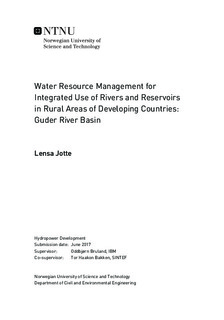Water Resource Management for Integrated Use of Rivers and Reservoirs in Rural Areas of Developing Countries: Guder River Basin
Master thesis
Permanent lenke
http://hdl.handle.net/11250/2454727Utgivelsesdato
2017Metadata
Vis full innførselSamlinger
Sammendrag
Impact of climate change on runoff is a topic of great interest to hydrologists and hydropower developers. Often studies that involve effect of climate change on runoff in developing countries such as Ethiopia are conducted to analyse large scale hydropower. Very little research has been done on the impact of climate change on small catchments for the purpose of small scale hydropower. Since Ethiopia has 10% of untapped small scale hydropower potential, investment in small scale hydropower is one of the most productive ways to solve the energy problem in rural sides of Ethiopia. Bello catchment located in the Guder River Basin (GRB) was identified to have the capacity to produce 14.5 MW by the Ethiopian Ministry of Water Resource and Energy. When the prefeasibility study was conducted for this catchment, the effect of climate change, irrigation, and water supply demand within the area was not considered as a factor that might have impact on the future streamflow. The work that was done in this thesis addresses these problems.
The trend of the temperature, precipitation, and runoff of the catchment was analysed based on 18 years data (1987-2004). The trend characteristics were considered as the basis for the climate projections in the 2020s, 2040s, 2060s, 2080, and 2090s. The impact of the climate change projections on the runoff were analysed using Water Evaluation and Planning Tool (WEAP). In general, a trend of increase in temperature and decrease in precipitation was noted in the area. As expected, runoff reduction when the temperature increases and precipitation decreases was found to be significantly higher than the runoff reduction only with temperature increase scenario. The impact of reservoir construction on the runoff was also analysed by considering minimum and maximum net evaporation from the reservoir. The runoff reduction after the mid-century under the maximum net evaporation scenario was found to be much higher than the expected runoff reduction under the minimum net evaporation scenario. The irrigation and village sites have less impact on the runoff if the sites are located either far upstream of the reservoir or downstream of the reservoir. Conducting the impact of climate change and irrigation on the economic, social, and environmental aspects of the area has to be done in order to comprehend the full picture of the effects. The processes and methods utilized in this thesis can be used to study the degree of competition by different sectors on runoff of small catchments in other rural sides of the country.
